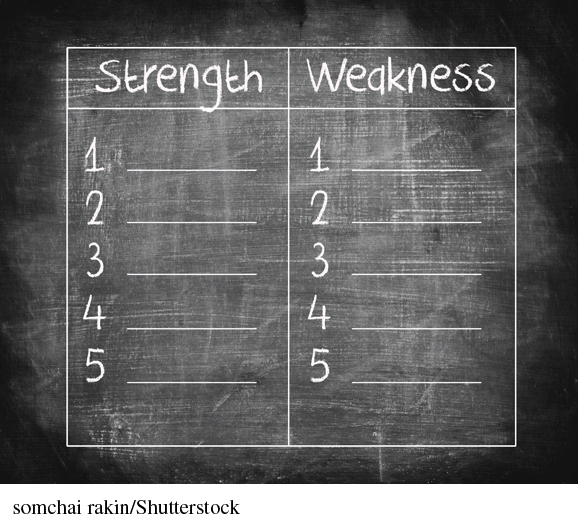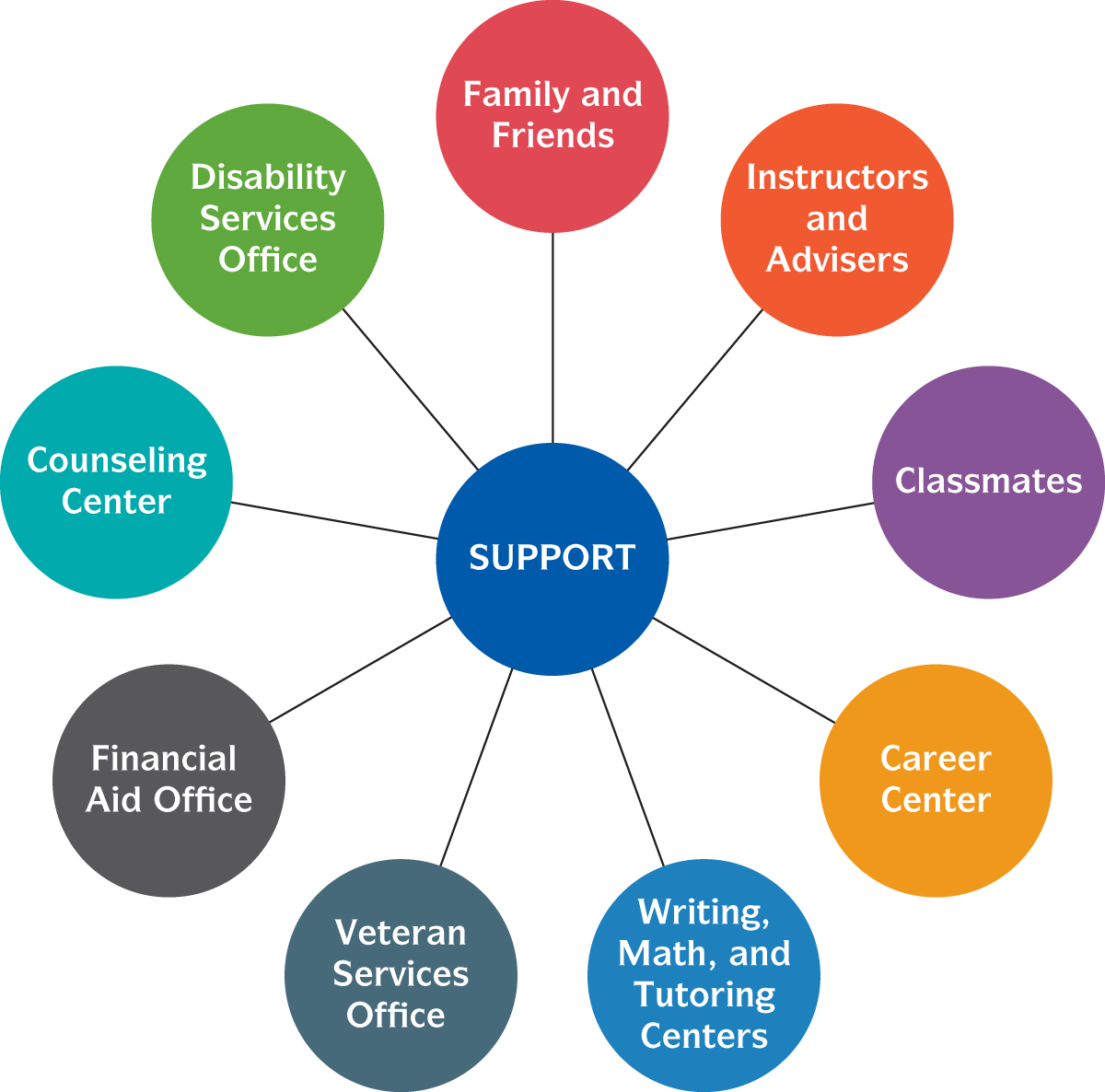Embrace Your Strengths — and Learn from Your Weaknesses


If someone asked you to describe your strengths, what would you say? Maybe you’d point out that you can negotiate a subway system like a pro, give great advice, or play guitar. You might explain that you’re a strong swimmer, you know how to design Web pages, or you can cook meals like a gourmet chef. What about your weaknesses? Would you find it harder to acknowledge that you have poorly developed writing skills or that you’re shy around people you don’t know? If so, you’re not alone: Many people feel far more comfortable talking about where they excel than revealing where they struggle.
But everyone has strengths and weaknesses, and a key to success and happiness is knowing what these are. Armed with this understanding, you can use your strengths, while also improving areas you find challenging.11 Using your strengths and working on your weaknesses takes effort. You need those four key ingredients of positive psychology: self-efficacy, resilience, a sense of hope, and a willingness to take personal responsibility.
FEATURE: Critical thinking, evaluating sources of information, and quantitative reasoning are vital to college and career success. The Spotlight on Research feature in each chapter encourages students to practice these skills. It distills the results of a chapter-related study using accessible language, a graphic showing the study’s major findings, a “bottom line” message, and reflection questions. To reinforce this feature’s impact, you can ask students to reflect on study results in writing or during class discussion.
As you think about building your strengths, consider basketball. Every team has players with different specialties. For example, the point guard has long-range shooting skills, understands the opponent’s defenses, and has the best ball-handling skills. The center is typically the tallest and most athletic player on the court and can secure rebounds. The coach makes sure each player uses his or her best skills while also addressing weak areas. Everyone has to practice ball handling, free throws, rebounding, and distance shooting — regardless of whether it comes naturally — because these skills are necessary for the team to succeed.
When it comes to the game of college, you’re your own coach. You need to take advantage of your strengths and play to them regularly, but you also need to work on your weak areas. This book, your instructors, and the resources available on campus will help you build winning attitudes and skills. But ultimately, it is your responsibility to put those attitudes and skills into action. By focusing on using your strengths and addressing your weaknesses, you’ll become as versatile in the classroom as professional athletes are on the court.
Identify Your Strengths and Your Weaknesses: ACES and Other Tools
Before you can use your strengths and address your weaknesses, you need to know what they are. Figuring this out isn’t always easy. It requires a healthy dose of self-reflection (and often a reality check) to acknowledge what you do well and where you struggle. It also involves collecting concrete information about yourself, which can come from the following sources:
WRITING PROMPT: Ask students to think about a time when they didn’t perform as well as they wanted. As their own coach and using what they now know about positive psychology, what would they tell themselves? What “calls” would they make to decrease the likelihood of this happening again?
The Academic and Career Excellence System (ACES). Did you know that with this book you likely got access to an online self-assessment that will help you understand yourself better? It’s called ACES (which stands for Academic and Career Excellence System). Have you taken ACES already? If not, you probably will soon. ACES helps you identify your strengths and weaknesses and use that information to establish goals. You’ll revisit different ACES scores at the beginning of each chapter in the rest of this book and reflect on how you might better use a strength or improve a weak area. By engaging in such reflection, you can read each chapter with a better understanding of what you want to accomplish.
Page 14Past successes and failures. Reflecting on your past successes and failures can provide a wealth of useful information. For example, can you recall a time when you were well prepared for an exam and another time when you weren’t? How did your grades reflect your preparedness? What lessons can you gain from these contrasting experiences? How can you apply those lessons so that you do better on future exams?
Class experiences. Think about your current classes. Are some more difficult for you than others? What do you think makes them harder for you? Reflecting on where you struggle can help you identify which skills you need to strengthen.
End-of-chapter activities. The activities at the end of each chapter often require you to consider how the chapter material relates to your strengths and weaknesses. You’ll also have further opportunities to practice developing your skills.
ACTIVITY: Ask students to complete ACES before starting the next chapter. Beginning in that chapter, they will be asked to reflect on their scores and use what they’ve learned about themselves to master chapter content.
Once you’ve consulted these sources, then what? Learning about your strengths and weaknesses is great, but this information is useless if you don’t use it to create positive change. That’s what this book and this class are for: to help you achieve the necessary changes. In each chapter, you’ll work on developing a new skill — such as setting goals, managing your time, reading a wide range of course materials, taking notes, and studying for exams. As you build these skills in this class, you can use them to succeed in your other classes, too. Why? Because as we pointed out earlier, all your learning is connected.
FOR DISCUSSION: Being your own coach means making wise use of the resources available. Ask students how seeking help involves taking charge of our own success. What barriers prevent us from seeking help? What steps can we take to remove these barriers?
Recruit Help
CONNECT
TO MY RESOURCES
When things get tough in school, at work, or in your personal life, who’s there to support you? Write a thank-you note to one special person, letting that person know why he or she is such a great support to you.
There are many ways to build skills on your own, but you don’t have to “fly solo” in this effort: You can recruit a team of supporters to help you when you struggle. According to a growing body of research, seeking help can increase your level of success.12 Also, getting help is a form of taking personal responsibility: When you identify what challenges you face, what resources exist, and how to use them, you take charge of your own success.
Help is everywhere, once you know what’s available and where to look for it (see Figure 1.2). Off campus, you can find help from family members, friends, and community resources. On campus, you can find help from instructors, classmates, advisers, and support services like the math lab, writing center, and career center. To take advantage of the support resources around you, follow these three steps:
ACTIVITY: Many students hesitate to approach new individuals. Using the questions in Table 1.2 as a guide, invite students to role-play visiting different offices on campus. Discuss possible stumbling blocks they may encounter.

Know what resources exist. You can choose from countless resources, so find out which ones are available to you. If you’re not sure which resources exist at your school or in the surrounding community, seek help from your instructor, an adviser or a counselor, or the campus Web site.
Page 15Know which resources you need. Think about which resources you need in a particular situation. If you’re struggling in English class, for example, you won’t get much help from the financial aid office. If you don’t know which resources to seek out, ask your instructor or an academic adviser. They’re skilled student-success specialists and will point you in the right direction.
Use available resources. Once you know which resource is appropriate for a particular need, take action. For example, find out how best to contact the tutoring center (do you need to make an appointment, or can you just walk in?); then do it. If you don’t know how to approach campus resources, ask your instructor or adviser for advice, or search your school’s Web site for information. Table 1.2 provides examples of questions you can ask to get help from several key sources.
| Advising center |
May I please meet with an adviser? I have some questions about scheduling my classes for next term. I’d like to find classes that will help me decide on my major. Can you help with that? I want to declare a major in psychology, but my adviser is in the English department. Can she still be my adviser? I’m having difficulty in my algebra class. Can you suggest where I can get some help? |
| Financial aid office |
I missed the deadline for applying for aid this year. What are my options for paying for classes this term? I need to work while I’m in school. Are there any opportunities to work on campus? I don’t want to take on too much debt. Can you help me create a plan for managing my finances? What scholarships are available in my field of study? |
| Instructors |
I’m really struggling in this class. Can you recommend some additional reading materials or support services that can help me? Do you know of an advanced student who might be interested in helping me understand this material? I’m very interested in what we’re covering in this class, and I’m thinking about majoring in this area. Can you give me the name of someone I can discuss this with? |